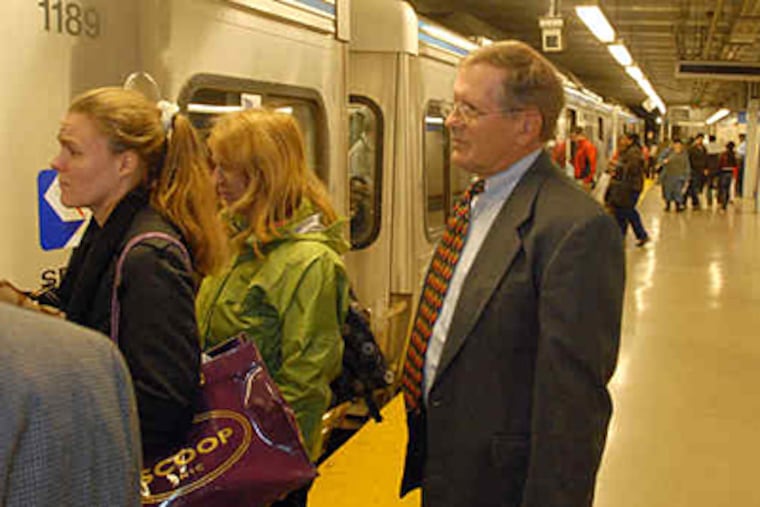SEPTA seeks first fare hike in 3 years
SEPTA wants to raise fares by about 6 percent for most bus, rail, subway and trolley passengers, starting July 1.

SEPTA wants to raise fares by about 6 percent for most bus, rail, subway and trolley passengers, starting July 1.
The proposed fare increases would be the first since 2007 and are designed to match inflation over the past three years, general manager Joseph Casey said in announcing the proposed increases today.
SEPTA's proposal, which requires approval by the agency's board, would increase the cost of a bus or subway token to $1.55, from the current $1.45. The cost of a transfer would rise to $1, from the current 75 cents.
SEPTA also proposes to eliminate off-peak train fares before 7 p.m. on weekdays. Currently, passengers pay peak fares only on trains arriving at Center City stations before 9:30 a.m. and departing Center City between 4 p.m. and 6:30 p.m.
And the agency wants to consolidate some rail zones.
SEPTA officials also warned today that many of the agency's future projects, such as a rebuilt City Hall subway station and a "smart card" fare system, will be put on hold if a state plan to install tolls on Interstate 80 is rejected by the U.S. Department of Transportation.
Public hearings on the fare increases and SEPTA's proposed operating and capital budgets for the fiscal year that begins July 1 will be held next month.
Matthew Mitchell, of the Delaware Valley Association of Rail Passengers, criticized the proposed increase in the cost of transfers and the elimination of daytime off-peak trains.
"If SEPTA gets its way, the price of transit transfers will have gone up 150 percent in the last ten years," Mitchell said. "SEPTA didn't get its way when it tried to eliminate transfers in 2007-now they're trying to eliminate them in a back-door fashion.
"SEPTA's policy of very high transfer fares promotes inefficient use of the transit network. If it costs $1 to transfer from the bus to the subway, passengers will stay on the bus for their ride to Center City."
Mitchell said it would be better to increase the base cash fare by 25 cents.
And he said eliminating mid-day off-peak fares was "a half-baked idea that could have unintended consequences." Without an incentive to ride on off-peak trains, he said, some passengers will switch to rush hour trains and worsen overcrowding.
SEPTA proposes a $1.18 billion operating budget, up nearly five percent from the $1.13 billion operating budget this year year. Among the costs contributing to the increase are higher medical costs for employees and higher costs for electricity.
Ridership is also expected to drop by nearly two percent in fiscal 2011, because of the fare increases, chief financial officer Richard Burnfield said.
Other transit agencies in the region and the nation are also seeking fare hikes and many are warning of service reductions. In New Jersey, for example, NJ Transit is seeking to raise fares 25 percent fare hikes and to cut bus and train service around the state.
SEPTA officials said their proposed increases are smaller than most and are not accompanied by cuts in service. The increases are designed to provide an additional $22 million in revenue, an increase of about 5 percent, said Burnfield.
"It's something we have to do," said SEPTA board chairman Pasquale "Pat" Deon Sr. "It's about keeping the place viable."
For bus and subway riders, a weekly pass would cost $22, up from the current $20.75. A monthly pass would cost $83, instead of the current $78.
For Regional Rail passengers, a Zone 3 monthly pass would cost $157, up from the current $142.50. A Zone 2 monthly pass would cost $128, instead of the current $116.
SEPTA officials today also warned of dire consequences if they don't get a share of the money anticipated to be generated by tolls on I-80.
They were counting on about $120 million from I-80 tolls. The money was intended to boost SEPTA's capital budget, for such things as new stations, a "smart card" fare system, and an extension of the Media-Elwyn rail line.
Without I-80 tolls, SEPTA's capital budget for fiscal 2011 would drop to about $300 million, from about $420 million. That doesn't include the one-time infusion of nearly $200 million in federal stimulus funds this year.
Pennsylvania wants to make I-80 a toll road for its 311-mile length across northern Pennsylvania, administered by the Pennsylvania Turnpike Commission. The Federal Highway Administration has twice denied the state's bid to do so, and a decision is expected this month on the state's third application.
Supporters of the tolls, including SEPTA, labor and business groups and local politicians, have launched a campaign to urge senators and representatives to push for approval in Washington.
In northern Pennsylvania, though, local officials and politicians have been lobbying to block the tolls, arguing they would cripple the local economy and push heavy trucks onto local roads.
Deon, the Bucks County Republican who is SEPTA's board chairman and a member of the Turnpike Commission, said thousands of construction jobs and a thriving economy in Southeastern Pennsylvania are riding on the I-80 tolling decision. And he called for the the state's congressional delegation, especially Sen. Arlen Specter (D., Pa.), to persuade the transportation department to approve the tolls.
"Arlen needs to be pushing for it and not dancing around it. He's like a ballerina," Deon said.
Specter, in a tough battle for re-election, last week declined to say whether he supported tolling I-80.